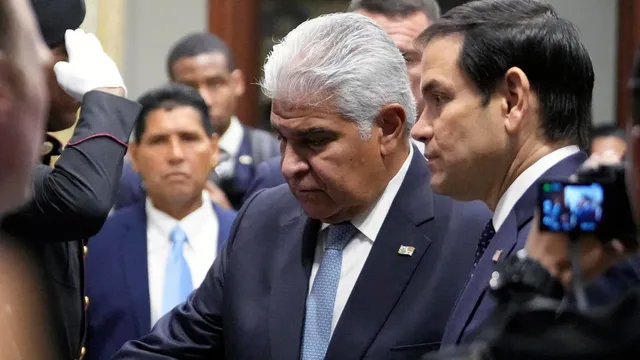
Rubio warns Panama about U.S. action over Chinese influence on canal
2025-02-06 11:18- Marco Rubio emphasized the need for immediate action from Panama to reduce Chinese influence over the canal during a meeting with President José Raúl Mulino.
- The U.S. alleges that China's involvement in the area violates the 1999 treaty that established the canal's permanent neutrality.
- If Panama does not act, the U.S. may take measures to protect its rights under the treaty.
Express your sentiment!
Insights
During a recent meeting in Panama City, U.S. Secretary of State Marco Rubio conveyed President Donald Trump's concerns about Chinese influence along the Panama Canal to Panamanian President José Raúl Mulino. This meeting, occurring on February 2, 2025, marks Rubio's first foreign visit as Secretary of State. Trump’s administration has alleged that the presence of Chinese businesses, particularly a Hong Kong-based company operating ports at either end of the canal, violates the neutrality treaty established when control was transitioned to Panama in 1999. Rubio emphasized that immediate changes are required from Panama to mitigate these concerns. President Mulino, while acknowledging the U.S. apprehensions regarding China's role in the canal operations, expressed confidence that there is no imminent threat to the neutrality treaty. He indicated a willingness to review agreements involving Chinese enterprises and announced that Panama would not renew its participation in China's Belt and Road Initiative upon its expiration. Following their discussions, Mulino sought to portray the encounter as cooperative, highlighting the necessity of diplomatic negotiations to clarify any doubts about Panama’s sovereignty over the canal. Protests against Rubio's visit erupted in Panama, reflecting public discontent regarding U.S. interference in national affairs. Demonstrators voiced their defiance against what they perceive to be threats to their sovereignty. Rubio's demands for Panama to alleviate Chinese influence align with broader U.S. foreign policy objectives aimed at curtailing China's expanding presence in Latin America, asserting the need for U.S. guidelines in the region's geopolitical landscape. The meeting underscored the escalating tensions over Chinese investments in Panama, particularly concerning vital infrastructure like the Panama Canal, which plays an essential role in global commerce. The canal is crucial for U.S. shipping, with approximately 40 percent of container traffic passing through its waters. Rubio's statements not only reflect concerns regarding potential disruptions by China but also signify an assertive approach from the U.S. government in maintaining its interests in the area. The outcome of this diplomatic engagement remains to be seen as both countries navigate their diplomatic relations amidst growing geopolitical stressors.
Contexts
The impact of US foreign policy in Latin America has been profound and complex, shaping the political, social, and economic landscapes of the region for decades. Historically, US foreign policy has been characterized by a mix of interventionist strategies and diplomatic efforts, often driven by the interests of national security, economic expansion, and ideological alignment during the Cold War. The US's approach has ranged from direct military interventions and support for authoritarian regimes to promotion of democratic governance and economic partnerships. This duality in policy motives has led both to development gains in some areas and significant challenges, including political instability and social unrest in others. One of the key aspects of US foreign policy in Latin America has been the doctrine of containment during the Cold War, which led to various interventions, notably in countries such as Guatemala, Chile, and Nicaragua. These interventions often sought to combat perceived communist threats, resulting in the support of regimes that repressed political dissent and violated human rights. While some US policies aimed to stabilize governments and promote economic development, the long-term consequences frequently included cycles of violence and entrenched poverty. The legacy of these policies continues to affect US-Latin America relations, contributing to widespread distrust, anti-American sentiment, and ongoing socio-political divisions within the region. In recent years, US foreign policy has emphasized engagement through economic partnerships, trade agreements, and collaborative approaches to issues such as drug trafficking and migration. Initiatives like the Central America Free Trade Agreement (CAFTA) aimed to bolster economic growth and stability; however, challenges persist. Many Latin American countries continue to grapple with issues such as inequality, corruption, and political instability, often exacerbated by foreign intervention and economic dependencies. As a result, the effectiveness of US foreign policy strategies remains a critical point of debate, particularly as new powers, like China, expand their influence in the region, complicating the traditional US dominance. As we move forward, the changing dynamics of global politics necessitate a reassessment of US foreign policy towards Latin America. The focus should shift towards more equitable partnerships that respect the sovereignty of Latin American nations while addressing overarching challenges, such as climate change, migration, and economic inequality. A comprehensive approach that prioritizes human rights, social justice, and sustainable development will be essential for fostering a more stable and prosperous Latin America, ultimately benefiting both the region and the United States. In this context, understanding the historical ramifications of past policies will be critical to crafting future strategies that truly support the interests and aspirations of Latin American peoples.